As the Allies prepared to renew their offensive in southern Italy, Soviet forces in Russia were pressing the Germans along the line of the Dnieper River. Soviet troops were able to secure footholds on the eastern bank and advanced towards the city of Kiev. In the Crimea, 150,000 German and Romanian troops were now encircled and cut off. Also this week, on 29 October London dockworkers went on strike and were replaced with soldiers.
 The Head Teacher of Canisbay School noted with satisfaction in the log book this week that “There has been a
The Head Teacher of Canisbay School noted with satisfaction in the log book this week that “There has been a 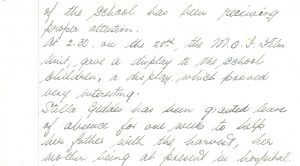 welcome rise in percentage [of pupils attending] this week, since the harvest has been well advanced and the potato lifting finished… Stella Geddes has bene granted leave of absence for one week to help her father with the harvest, her mother being at present in hospital.” The school also had a visit from the Ministry of Information Film Unit, who “gave a display to the school children, a display which proved very interesting.”
welcome rise in percentage [of pupils attending] this week, since the harvest has been well advanced and the potato lifting finished… Stella Geddes has bene granted leave of absence for one week to help her father with the harvest, her mother being at present in hospital.” The school also had a visit from the Ministry of Information Film Unit, who “gave a display to the school children, a display which proved very interesting.”
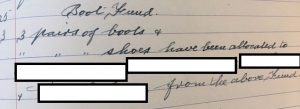 The wartime shortage of shoe leather had prevented some children from walking to school – the quality of new shoes was poor and shoemakers didn’t have the leather to do repairs. Now the County Council had established a Boot Fund to supply shoes to children who needed them, as the Gillock School log book recorded on 25 October: “Boot Fund: 3 pairs of boots & 3 pairs of shoes have been allocated … from the above fund” [children’s names redacted].
The wartime shortage of shoe leather had prevented some children from walking to school – the quality of new shoes was poor and shoemakers didn’t have the leather to do repairs. Now the County Council had established a Boot Fund to supply shoes to children who needed them, as the Gillock School log book recorded on 25 October: “Boot Fund: 3 pairs of boots & 3 pairs of shoes have been allocated … from the above fund” [children’s names redacted].
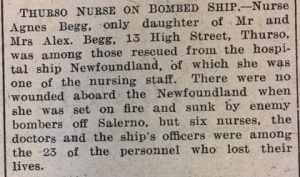 The John O’Groat Journal reported that a nurse from Thurso, Agnes Begg, was among those rescued from the hospital ship Newfoundland: “There were no wounded aboard the Newfoundland when she was set on fire and sunk by enemy bombers off Salerno, but six nurses, the doctors and the ship’s officers were among the 23 of the personnel who lost their lives.”
The John O’Groat Journal reported that a nurse from Thurso, Agnes Begg, was among those rescued from the hospital ship Newfoundland: “There were no wounded aboard the Newfoundland when she was set on fire and sunk by enemy bombers off Salerno, but six nurses, the doctors and the ship’s officers were among the 23 of the personnel who lost their lives.”
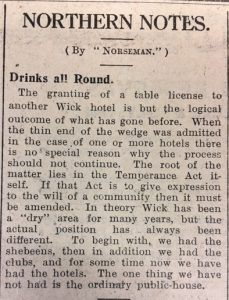 Finally this week, ‘Norseman’ in the John O’Groat Journal noted that prohibition in Wick, which had been in force since 1922, was gradually
Finally this week, ‘Norseman’ in the John O’Groat Journal noted that prohibition in Wick, which had been in force since 1922, was gradually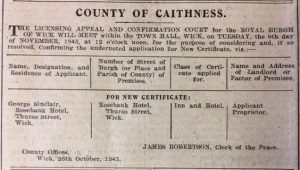 being eroded, as the Rosebank Hotel on Thurso Street was granted a licence to serve alcohol to dining customers: “In theory Wick has been a “dry” area for many years, but the actual position has always been different. To begin with, we had the shebeens, then in addition we had the clubs, and for some time now we have had the hotels. The one thing we have not had is the ordinary public house.”
being eroded, as the Rosebank Hotel on Thurso Street was granted a licence to serve alcohol to dining customers: “In theory Wick has been a “dry” area for many years, but the actual position has always been different. To begin with, we had the shebeens, then in addition we had the clubs, and for some time now we have had the hotels. The one thing we have not had is the ordinary public house.”
Coming soon! Week 128, 1st – 7th November 1943, will be published on Monday 31st October 2016. To view previous issues please use the menus on the right hand side of the page.
Come and join us on Facebook, let us know what you think about Caithness At War, ask any questions you may have or just say hello! Click on the Facebook link below to be taken directly to our page.
